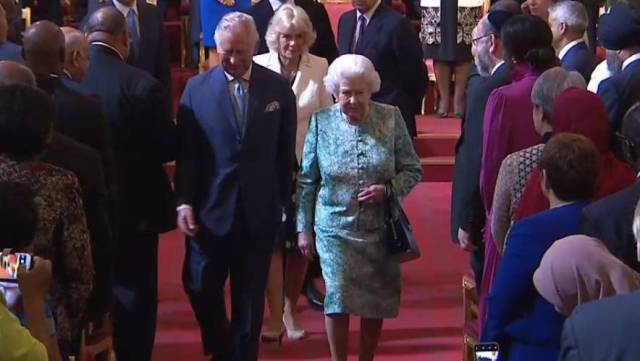 Commonwealth leaders agreed in 2018 that Prince Charles would succeed the Queen as Head of the Commonwealth. [photo: livestream screen]
Commonwealth leaders agreed in 2018 that Prince Charles would succeed the Queen as Head of the Commonwealth. [photo: livestream screen]
[This article is from The Round Table: The Commonwealth Journal of International Affairs.]
King George VI was given the title Head of the Commonwealth, and with the unanimous agreement of the Heads of Government, this was passed to Queen Elizabeth II. This is an honorary position and is not hereditary. That is why, just before the opening of the Commonwealth Heads of Government Meeting (CHOGM) in London on 16 April 2018, Heads agreed that Charles, Prince of Wales, on succeeding to the crown would also be granted that title. For the Duke of Cambridge, when that time comes, a similar process will be required.
The development of what is known today as the Modern Commonwealth goes back to the London Declaration of 1949 and came about after India’s independence on 15 August 1947. This was the result of the work of the first Prime Minister of India, Jawaharlal Nehru, who wanted India to have a President as Head of State. The Declaration stated that ‘republics and other countries could be part of the Commonwealth’ as well as saying that members could accept the British Sovereign as a ‘symbol of the free association of its independent member nations and as such as the Head of the Commonwealth’. With this, the modern concept was born and has developed since that time. The Commonwealth Secretariat was created in 1965, with Arnold Smith of Canada as its first Secretary-General.
CHOGM 2018 Outcomes
Leaders meet at CHOGM 2022
The Commonwealth A “free association of self-governing nations”
The Commonwealth now has 56 member countries of which only 14, aside from Britain, have the Queen as their Head of State. Five of these, Brunei, Eswatini, Lesotho, Malaysia and Tonga, have their own monarchical systems, while four countries, Mozambique, Rwanda, Gabon and Togo, have no colonial connection to Britain. To become a member, there is now a process conducted by the Commonwealth Secretary-General. This examines an applicant’s credentials, ensures they fit within the remit of the Commonwealth Charter and requires an assurance that the country’s wish to join has the support of its people and its elected representatives. A referendum, however, is not required. The final decision rests with Heads of Government, although this can be given in writing so it does not need to wait for Heads to meet, although unanimity is required and, therefore, is not decided by a formal vote.
The process of application was refined in the extensive Report of the Committee on Commonwealth Membership, chaired by the former Prime Minister of Jamaica, the Most Hon. P.J. Paterson, ON, PC, QC and was completed in September 2007. In its covering letter to the then Secretary-General, Rt Hon Sir Don McKinnon, the Chairman wrote that ‘The Committee believes that adherence on the Commonwealth’s fundamental principles and values must remain the core criteria for any new members. It is these values tha t define the modern Commonwealth and bind its members together. While it is important to open the door to new members, it should be done cautiously and there should be no compromise on fundamental values’.
On 11 March 2013, the Commonwealth Charter was officially signed by Queen Elizabeth II. This important document enshrines commitment to democratic norms and human rights and embodies all important documents adopted by Heads of Government since 1949. As such, acceptance of it has become essential for any country seeking membership or readmission. As a result, the process for admission/readmission of new members is now firmly in place and is conducted by the Secretary-General in office at the time. Once that is successfully completed, a recommendation for membership is sent by the Secretary-General to the Heads of Government for their agreement and that requires unanimity. A possible candidate for admission in the future is Ireland. This has often been discussed behind closed doors, and past Presidents of Ireland and Taoiseach (prime ministers) have expressed support. Eamon de Valera was interested in following India’s example, but his successor at the time John Costello is credited with overruling the idea. The Irish Times has written on 10 August 1998 that the ‘Time has come for Ireland to re-join the Commonwealth of 54 Sovereign States’, but the devil is in the timing. In any event, a CHOGM in Dublin would be a very hospitable event.
The Monarchy, Republicanism and the Privy Council: The Enduring Cry for Freedom – 2012
The Monarchy and the Commonwealth: An Untimely Report – 2012
The monarchy in the Commonwealth: From king‐emperor to head of the Commonwealth – 1970
There is often misunderstanding, particularly in the media, as to the position within the Commonwealth of those countries which have the British Monarch as Head of State. The simple answer is once in always in, but those countries are free, within the parameters of their constitutions, to change to a different system of their choosing. The perfect example of this recently was Barbados, which on 30 November 2021 installed Sandra Mason, already serving as Governor-General, as its first President. Prince Charles attended the ceremony on behalf of the Queen. The process was seamless, with some dissent, perhaps, on the civil society side lines. As for Barbados and its membership of the Commonwealth, that has continued untrammelled, with no need for any kind of renewal process. However, there is no surprise at that because everyone accepts, Prince William included, that this has happened with other countries before and may well happen again.
Mark Robinson is a member of the Round Table Editorial Board.
The Round Table: The Commonwealth Journal of International Affairs
The Commonwealth and the international legal order
Commonwealth book shelf



